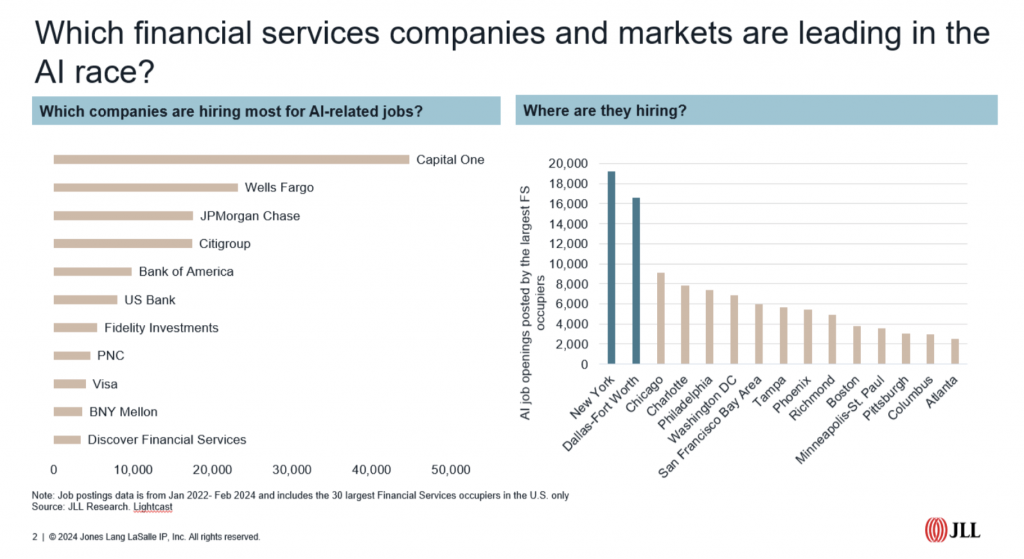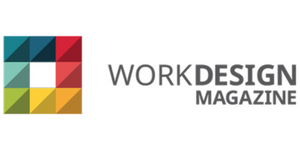- The demand for AI expertise is skyrocketing, causing fierce competition and significantly reshaping job markets.
- Attracting top AI talent requires offering cutting-edge projects, advanced computing resources, competitive compensation, and fostering a strong research culture with interdisciplinary collaboration.
- Companies can gain a competitive edge by designing flexible and supportive workplace experiences, promoting mental well-being, and prioritizing ethical AI practices and continuous learning.
This article was written by Ram Srinivasan, Future of Work Advisory Leader at JLL, for Work Design Magazine.
In the fast-paced world of artificial intelligence (AI), the race for top talent is heating up like never before. As AI continues to turbocharge innovation across industries, companies are scrambling to attract and retain the brightest minds in this field.
However, the supply of AI talent is alarmingly scarce, creating a fierce competition that is reshaping the job market and forcing organizations to rethink their strategies.
The Escalating Demand for AI Expertise
The demand for AI talent has skyrocketed, fueled by the rapid pace of technological advancements and the insatiable appetite for cutting-edge solutions. Silicon Valley tech giants are engaged in a high-stakes game of talent poaching, serving up million-dollar compensation packages, accelerated stock-vesting schedules, and even poaching entire engineering teams.
The stakes are high, as companies that fail to secure the best AI talent risk falling behind in the race for innovation. Take for example the Financial Services industry. JLL’s recent research, Financial Services: Future of Innovation Hubs analyzes how there are some early leaders in this AI talent race, but will they be able to hold their lead? Why are some succeeding when others have not?
Additionally, Bloomberg and Evident AI report that the major Wall Street Banks are in a fierce battle for top AI talent across key roles: AI development, model risk, data engineering, software development, and responsible AI deployment.

The Talent Bottleneck: A Critical Roadblock
While the demand for AI expertise continues to soar, the supply remains limited, creating a talent bottleneck that threatens to stifle progress.
According to a report by the Boston Consulting Group, only 10% of new AI roles are filled by existing staff, highlighting the scarcity of qualified candidates.
This shortage is exacerbated by the fact that a staggering 80% of AI talent leaves their current roles, among other things, due to a lack of perceived opportunities for career advancement.

What Top AI Talent Really Wants
To attract and retain the best AI talent, companies must understand the unique desires and preferences of these highly sought-after professionals.
Top AI talent typically seeks opportunities to work on cutting-edge and impactful projects, access to state-of-the-art computing resources, and competitive compensation packages.
They thrive in environments that foster a strong research culture, encourage open-source contributions and collaborations, and prioritize ethical AI practices.
Moreover, top AI talent values working in interdisciplinary teams, where they can learn from and collaborate with experts across various domains, such as natural language processing, computer vision, robotics, and cognitive science.
Access to powerful computational resources, including GPU clusters, TPU pods, and specialized hardware accelerators, is also crucial for training and experimenting with complex deep learning models efficiently.
Differentiating Through Workplace Experience
As the war for AI talent intensifies, companies are recognizing the power of the workplace experience as a secret weapon for attracting and retaining top talent. By designing workplaces that cater to the unique needs and preferences of AI professionals, organizations can differentiate themselves and gain a competitive edge in this fierce competition.
JLL Research shows that hybrid work patterns continue to flourish. The workplace experience encompasses both the physical office environment and the support for remote work. 51% of firms rank productivity as a key reason to attract staff back to the office but, for employees, poor office experience and noise are major barriers to returning.
Employees are calling for flexible work arrangements, the ability to choose where they work from, and high-quality workplace experiences.
For top AI talent this could mean being remote with the ability to connect in-person on-demand.
Collaborative spaces and flexible workspaces are key to enabling brainstorming sessions, fostering an atmosphere of creativity and ensuring knowledge sharing.
Dedicated research laboratories, equipped with cutting-edge computing resources and advanced visualization tools, provide top AI talent with the tools they need to push the boundaries of research and development.
Access to large-scale data centers and high-performance computing clusters empowers AI professionals to work with massive datasets and leverage scalable compute resources. Maker spaces and prototyping labs enable multidisciplinary collaborations and accelerate the development of innovative AI-powered products and services.
For those working remotely, companies must invest in robust virtual collaboration tools, secure remote access to computing resources, and seamless integration of remote workers into the organizational culture and workflow.

Mental health and well-being are coming into increasing focus as AI professionals are under significant stress and cognitive load. This is where amenities can play a role.
Amenities such as on-site gyms, meditation rooms, and outdoor spaces (for office workers) promote work-life balance and overall well-being, improving productivity and retention rates. Private offices, sound-insulated pods, and quiet zones cater to the need for focused, uninterrupted work sessions, while cutting-edge design and technology integration create an inspiring and stimulating environment that resonates with top AI talent.
To be sure these amenities are only a perk and not a panacea. Leadership and the culture of the organization play a much bigger role in attracting and retaining top AI talent.
The Future of AI Innovation
As the race for AI talent intensifies, companies that prioritize upskilling and invest in their employees’ growth are positioning themselves for long-term success. By fostering a culture of continuous learning and professional development, organizations can cultivate a pipeline of talented AI professionals and stay ahead of the curve.
Furthermore, companies that embrace ethical AI practices, promote transparency and accountability, and prioritize responsible development of AI systems will not only attract top talent but also build trust and credibility with their stakeholders and the public.
Winning the AI talent war is not just about offering competitive compensation packages; it’s about creating a workplace experience where top talent can thrive, collaborate, and push the boundaries of innovation.
By understanding the unique desires and preferences of AI professionals and designing workplaces that cater to their needs — both in physical office spaces and through robust support for remote work — companies can differentiate themselves and secure a competitive edge in the battle for the best minds in AI.



 Dr. Gleb Tsipursky – The Office Whisperer
Dr. Gleb Tsipursky – The Office Whisperer Nirit Cohen – WorkFutures
Nirit Cohen – WorkFutures Angela Howard – Culture Expert
Angela Howard – Culture Expert Drew Jones – Design & Innovation
Drew Jones – Design & Innovation Jonathan Price – CRE & Flex Expert
Jonathan Price – CRE & Flex Expert















